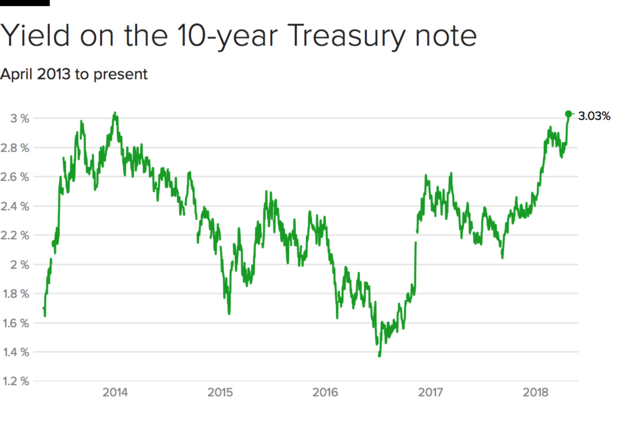Fear of rising interest rates is stalking Wall Street
Thanks to a post-earnings lift from Boeing (BA), the Dow Jones industrials ended a five-day losing streak on Wednesday. The Nasdaq Composite wasn't as lucky, however, posting its fifth straight loss.
Treasury yields and corporate earnings remain the focus, with the 10-year Treasury pushing further above the 3 percent level on Wednesday, closing at 3.03 percent -- a high not seen since 2014. The 2-year Treasury hit 2.49 percent -- its highest close in nearly a decade.
A combination of factors are behind these upward moves, including expectations of another Federal Reserve interest rate hike in June, rising inflation expectations and growing evidence that wage inflation is just around the corner.
Historical data comparing the relationship of job availability vs. wage gains shows -- if history is any guide -- that pay raises are coming. Which will provide the raw fuel needed to push up prices throughout the economy.
Watch for Fed policymakers to explore this point in their statement due next week. Currently, the futures market has essentially priced in another quarter-point hike at the Fed's June meeting. But the odds of an accelerating pace of rate increases is rising, with a 38 percent chance of three more this year (for a total of four), up from a 28 percent chance a month again.
This policy and inflation outlook is overshadowing what has been an extremely strong first-quarter earnings season so far. According to FactSet, S&P 500 earnings growth so far is tracking at 18.3 percent vs. last year's first quarter, with record high net profit margins.
Just look at Facebook (FB), which jumped 6.8 percent in after-hours trading following its report of earnings of $1.69 per share vs. $1.36 estimated on $12 billion in ad revenue. Daily active users increased 13 percent over last year, laying to rest the #DeleteFacebook fears.
But echoing the cautiousness of Caterpillar (CAT) management on Tuesday, who warned that the company's first-quarter results could be a "high water mark" for 2018 profitability, investors seem to be increasingly aware that the rest of this year may not be a walk in the park for stocks. Worries are growing that higher interest rates will jeopardize many of the tailwinds the bulls have enjoyed for years: debt-funded share buybacks, cheap consumer credit, affordable mortgages, low auto loan payments and higher bond prices.




